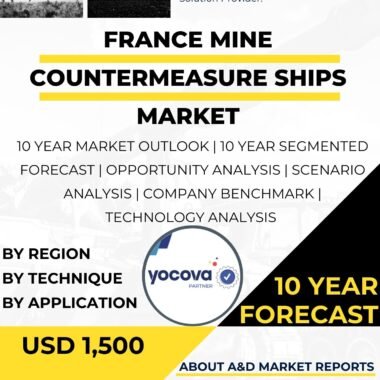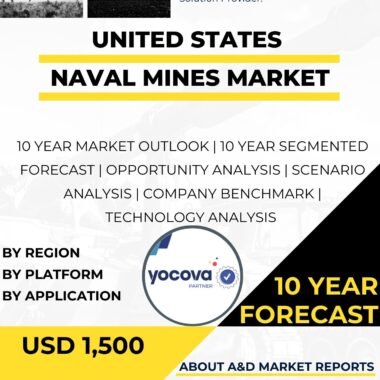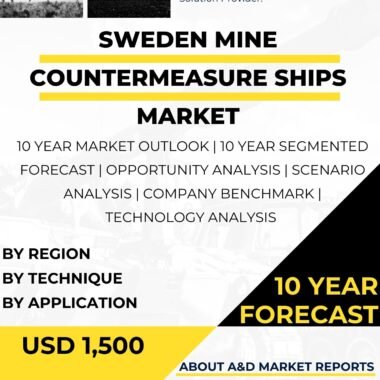Description
Brazil’s Mine Countermeasure Ships Market: An Overview
The Brazil Mine Countermeasure Ships Market is strategically important. It supports the country’s naval forces. Brazil actively safeguards its coastal waters from naval mines. Brazil also seeks to strengthen its maritime security.
MCM ships are specialized vessels. They are equipped with advanced sonar, mine-hunting systems, and mine-neutralizing technologies. These ships detect, locate, and destroy or neutralize naval mines. Brazil faces evolving security challenges in its maritime domain. Consequently, the market for MCM ships has gained prominence. This article analyzes the Brazil MCM Ships Market. It covers its current state, key drivers, challenges, and growth prospects.
Market Growth and Core Importance
The Brazil MCM Ships Market shows steady growth. This happens because Brazil increasingly focuses on enhancing its naval capabilities. It also addresses naval mine threats in its coastal waters.
Brazil’s maritime domain is vast. It includes a long coastline and significant offshore resources. Therefore, the need for mine countermeasure capabilities is critical. It ensures the safety and security of its maritime assets and trade routes. MCM ships play a vital role. They detect and neutralize naval mines. Thus, they reduce risks to commercial and naval vessels and support maritime operations.
Key Market Drivers
A primary driver for market growth is the need to safeguard Brazil’s maritime interests. Naval mines pose a significant threat. They endanger maritime traffic, commercial vessels, and naval assets.
Consequently, their presence in coastal waters can disrupt shipping routes. They can also hinder maritime trade and limit naval mobility. Thus, Brazil aims to bolster its maritime security. It invests in mine countermeasure ships to maintain safe, secure waters.
Furthermore, Brazil commits to enhancing its indigenous defense capabilities. This also drives the market. Brazil seeks to reduce dependency on foreign suppliers. Instead, it aims to develop its own defense industry, including MCM vessel production. In this way, investing in research, development, and production helps Brazil foster its domestic defense industry. This strengthens its self-reliance in meeting naval defense needs.
Diverse Applications
The market’s growth is also influenced by diverse applications of MCM ships. These occur across different maritime scenarios. Specifically, these vessels are essential for military operations.
However, they also play a crucial role in humanitarian mine clearance. They support international efforts to clear naval mines after conflicts. They also help in peacekeeping missions. Therefore, demand for mine countermeasure capabilities should increase. This is because Brazil upholds its international commitments and contributes to global maritime security.
Applications in Defense and Humanitarian Efforts
The Brazil MCM Ships Market finds diverse uses. It serves various naval defense and security domains. Each application contributes to the overall safety and effectiveness of the country’s maritime operations.
Naval Defense and Fleet Protection
MCM ships form a critical component of fleet protection and force projection in naval defense. Essentially, these vessels can detect and neutralize naval mines. This ensures safe passage for naval assets. It also allows naval forces to operate freely and effectively in coastal waters.
Humanitarian Support
Additionally, MCM ships play a significant role. They support humanitarian mine clearance operations. These vessels come equipped with advanced mine-hunting systems and Remotely Operated Underwater Vehicles (ROVs). This technology allows safe and effective mine neutralization. Brazil’s participation in international efforts underscores the versatility and importance of these capabilities. It helps clear naval mines and support post-conflict humanitarian missions.
Challenges Facing the Market
Despite the market’s growth and potential, the Brazil MCM Ships Market faces certain challenges.
One significant challenge is the high cost. This is associated with acquiring and maintaining MCM vessels. These specialized ships demand substantial investments. They require funding for technology, infrastructure, and training.
Interoperability with existing naval defense systems presents another challenge. Integrating new MCM ships into the country’s naval fleet requires seamless compatibility. It also requires joint operations planning.
The regulatory and legal landscape also poses difficulties. It surrounds the acquisition and operation of MCM vessels. International agreements and export controls govern the transfer and use of specific naval defense technologies, including MCM systems. Defense planners face complexities. They must comply with these regulations while maximizing technological advancements.
Moreover, skilled personnel are essential. They successfully deploy and maintain these specialized vessels. They need expertise in mine countermeasure technology and operations. Addressing the shortage of qualified professionals challenges the market’s sustainable growth.
Future Outlook and Conclusion
The Brazil MCM Ships Market expects continued growth and advancements. This is the future outlook. As the country faces evolving security challenges, it seeks to enhance its naval capabilities. Consequently, the demand for modern MCM ships will remain strong.
Continued investment in research and development is essential. Technology transfer agreements with international partners are also needed. Comprehensive testing and evaluation facilities must be established. Ultimately, these steps will help overcome challenges. They relate to MCM vessel acquisition and operation.
In conclusion, the Brazil MCM Ships Market plays a pivotal role. It helps Brazil strengthen its naval capabilities. It also safeguards its maritime interests. MCM ships offer critical capabilities. They detect, locate, and neutralize naval mines. This enhances the safety and security of Brazil’s coastal waters. Market growth is driven by Brazil’s commitment. It improves maritime security, fosters its domestic defense industry, and addresses emerging security threats. Addressing challenges is key. These include cost, interoperability, regulatory compliance, and skilled personnel. This action will unlock the full potential of MCM ships. It will bolster Brazil’s naval defense and national security.




